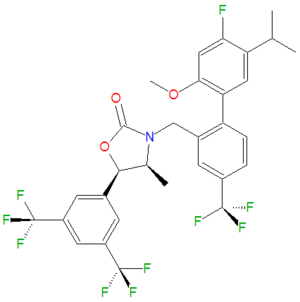Anacetrapib: Difference between revisions
Jump to navigation
Jump to search

imported>David E. Volk (Chem info box added) |
imported>David E. Volk No edit summary |
||
| Line 6: | Line 6: | ||
|width=300px | |width=300px | ||
|molname=anacetrapib | |molname=anacetrapib | ||
|synonyms= | |synonyms= see Chemistry | ||
|molformula= C<sub>30</sub>H<sub>25</sub>F<sub>10</sub>NO<sub>3 | |molformula= C<sub>30</sub>H<sub>25</sub>F<sub>10</sub>NO<sub>3 | ||
|molmass= 637.51 | |molmass= 637.51 | ||
|uses= | |uses= see below | ||
|properties= | |properties= see below | ||
|hazards= | |hazards= see below | ||
|iupac= see below | |iupac= see below | ||
|casnumber= 875446-37-0} | |casnumber= 875446-37-0 | ||
} | }} | ||
In [[health care]], '''anacetrapib''' (anacet'rapib) is an oxazolidinone [[medication]] that is a cholesteryl ester transfer protein inhibitor that raises [[HDL cholesterol]] and reduces [[LDL cholesterol]].<ref>{{MeSH}}</ref> | In [[health care]], '''anacetrapib''' (anacet'rapib) is an oxazolidinone [[medication]] that is a cholesteryl ester transfer protein inhibitor that raises [[HDL cholesterol]] and reduces [[LDL cholesterol]].<ref>{{MeSH}}</ref> | ||
Revision as of 09:08, 26 November 2010
|
| |||||||
| anacetrapib | |||||||
| |||||||
| Uses: | see below | ||||||
| Properties: | see below | ||||||
| Hazards: | see below | ||||||
| |||||||
In health care, anacetrapib (anacet'rapib) is an oxazolidinone medication that is a cholesteryl ester transfer protein inhibitor that raises HDL cholesterol and reduces LDL cholesterol.[1]
Anacetrapib is related to torcetrapib.[2]
References
- ↑ Anonymous (2024), Anacetrapib (English). Medical Subject Headings. U.S. National Library of Medicine.
- ↑ Cannon CP, Shah S, Dansky HM, Davidson M, Brinton EA, Gotto AM et al. (2010). "Safety of Anacetrapib in Patients with or at High Risk for Coronary Heart Disease.". N Engl J Med. DOI:10.1056/NEJMoa1009744. PMID 21082868. Research Blogging.
